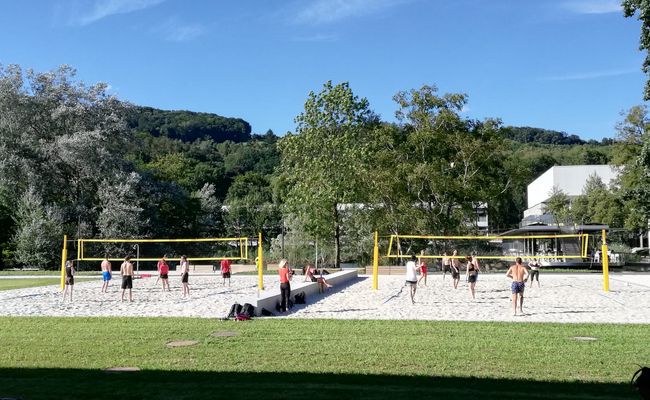Statics is about the structural stability. When teaching statistics, we aim to draw conclusions by looking at the data.
Will your favorite sports team win tonight? Would you make a lot of money selling air conditioners on account of climate change? As a data scientist, you are part computer scientist and part trendspotter. Pursue a competitive career edge now!
Students in the Bachelor's degree program in Statistics and Data Science focus on learning how researchers draw conclusions about climate change, how banks assess stock market risks, and how betting companies calculate their odds. Data analysis serves as a basis to calculate just how the world is moving. Together with experts in corresponding fields, program graduates work on these types of topics and more, helping to shape the future.
Data Managers are highly sought-after at many companies. Company success is based on data analytics and is one of many reasons just why companies and institutions - including the Voestalpine, Hofer KG, Runtastic, Statistik Austria, Google, Netflix as well as banks and hospitals - rely on your understanding and background as a statistician and/or data scientist.
Page Content
Key Facts
Degree
Bachelor of Science (BSc)
Duration
6 semesters
ECTS
180 credits
Language
German (Level B2)
Location
Linz
Program
Full-Time/Part-Time
What Makes This Program Special
- The Bachelor's degree program in Statistics is unique in Austria, featuring a combination of data science and artificial intelligence. We take advantage of the JKU's resources and classes offered in the fields of computer sciences, business informatics, and artificial intelligence.
- Students can write their thesis for a company and even get paid for their work. In the past, students have written theses for companies that include Hofer KG, Greiner, voestalpine, Pöttinger, Cubido, the Upper Austrian Chamber of Labour, Statistik Austria, and many more.
- You will acquire a broad spectrum of skills and expertise ranging from loan approval to developing new drugs. A variety of companies are seeking experts to advance their company's success.
- The Statistics and Data Science program at the JKU Linz has a low student-to-faculty ratio and students enjoy personal contact with professors and classmates at this department as well as at other departments. Students can discuss any problems or issues in a more personal setting.
Program Structure
As part of the Bachelor’s degree program, students must successfully complete classes totaling 180 ECTS credits in the subject areas of theoretical, applied and practical statistics, data science, mathematics, computer science, supporting content, gender studies, electives, and autonomous coursework.
Detailed information about the program structure and courses is available in the curriculum and in the course catalog.
Studies Introduction and Orientation Phase (StEOP)
New students will be required to complete the StEOP requirements at the beginning of the Bachelor's degree program. The required StEOP courses are outlined in the curriculum. Students must pass the required StEOP courses in order to continue on with the program and register for courses as outlined in the curriculum.
Areas of Specialization
Students in the Bachelor's degree program Statistics and Data Science acquire expertise in:
- Statistics - Learn about various methods to sift through information and acquire insight to make educated predictions and prognoses.
- Data Science - Learn how to use the right software and apply statistical methods to concrete data sets. At the same time, acquire a base-knowledge understanding of Artificial Intelligence (AI), machine learning, and data mining.
- Mathematics and Computer Science - Skills in these related subjects can help you better understand statistical methods and better manage data. In the area of statistics, you will learn how to use the free software R and learn about the popular statistics packages SAS and SPSS. In addition, your education in computer science includes learning Python and Java.
You will learn how to analyze data. The results will help you create solutions that are in high demand in today's business world, for example, as well as in industry, medicine, and biology. Supporting content and autonomous coursework allow you to individually specialize in a field.
Study for a Day
Are you interested in one of our academic degree programs? Visit our JKU campus and hang out with a JKU student. You can attend a class and get first-hand information about studying at the JKU. Click here for sign up.
What You Will Learn in the Program
You will acquire a comprehensive and interdisciplinary understanding of the fundamentals within statistics and data science along with the following skills:
- a solid base-knowledge understanding of mathematics and computer science
- a strong understanding of models and methods to retrieve and analyze data
- the ability to apply statistical methodology to address real-world issues
- a strong social skill set and learning how to work effectively as part of a team
- innovative insight to advance methods
- a comprehensive understanding of data literacy, enabling you to extract useful knowledge and insight based on the data. These include the ability to make predictions, identify corresponding correlations, and assess important parameters.
Did you know that ...?
global warming impacts high-altitude alpine vegetation? How do production parameters influence product quality? As a statistician and data scientist, you are often involved in these types of exciting and contemporary research studies!
Career Prospects
Your career opportunities lie in areas that require data to be collected, systematically managed, evaluated, and presented on a large scale. You are in high demand in the job market because, among other things, the demand for educated statisticians and data scientists is growing exponentially in lieu of digitization and new data collection methods. Our graduates learn about addressing the following:
- Industry and Research: Can I develop a robotic vacuum cleaner that work better than previous models?
- Healthcare: How well do relatives cope when caring for loved ones who have dementia?
- Medicine: Does the new drug really work better?
- Banks and Insurance Companies: Who is eligible for a loan? How much risk provision does a bank need in order to avoid a future banking crisis?
- Statistics Offices: How can I make information available to the general public without relaying someone's personal information?
- Market and Opinion Research: Where do young people like to go on vacation (and with whom)?

Register to Enroll
Requirements
In order to be admitted to the Bachelor's degree program, you must fulfill the following requirements.
- Hold general higher education entrance qualifications (such as an Austrian "Matura" diploma)
- If your first language is not German, you will be required to submit proof of a B2 level of language proficiency in German.
Preparation Courses
To help you start your studies, you can take the preparation course "Mathematik mit Schwerpunkt auf Statistik und Wahrscheinlichkeitsrechnung" during your first semester, or the preparation course "Praktische Programmierkenntnisse" during the last week of September (provided these courses are being offered). These courses have been designed to assist students at the start of their studies as the courses cover selected topics from math classes at higher level schools and provide a basic introduction to programming.
Still Have Questions?
Then contact us!
Department
Admissions Office
Building
Frequently Asked Questions
On the contrary. Statistical methods provide exciting insight that plays a key role in developing new drugs and supporting management decisions.
While a good understanding of mathematics would be an advantage, a basic interest and aptitude in mathematics is enough. The JKU offers preparation courses in mathematics to help you get started, giving you an opportunity to revise the material taught at upper-level high schools.
The Bachelor's degree programs in Artificial Intelligence and Statistics & Data Science overlap to the extent that both programs include courses in mathematics, computer science, data science, and machine learning.
The program objective, however, is different: While our program provides students with a broad spectrum of statistical methods that can be used to analyze data, the undergraduate degree program in Artificial Intelligence focuses on computer sciences.
Another difference is the language of instruction: Statistics & Data Science is offered in German.
Still Have Questions?
Do you need help registering or do you have questions about the program? Contact the JKU's Office of Student Information and Academic Advising (SIBS)!
STAY UP-TO-DATE
... and sign up to receive the JKU Newsletter for prospective students! Everything you need to know about studying at the JKU, upcoming events. and what's new.
Advanced Degree Programs
After completing your undergraduate degree, you can continue your education by pursuing an advanced degree:
Similiar Degree Programs
You may also find these degree programs interesting:
-
All Bachelor's and Diploma Degree Programs
Overview




